The first thing the sea did was straighten. Not calm—orderly. Swells laid themselves into right angles and long dim lines glowed under the skin of the water, a ghostly grid that shifted when you weren’t looking. The sky above felt thinner, like canvas stretched too tight.
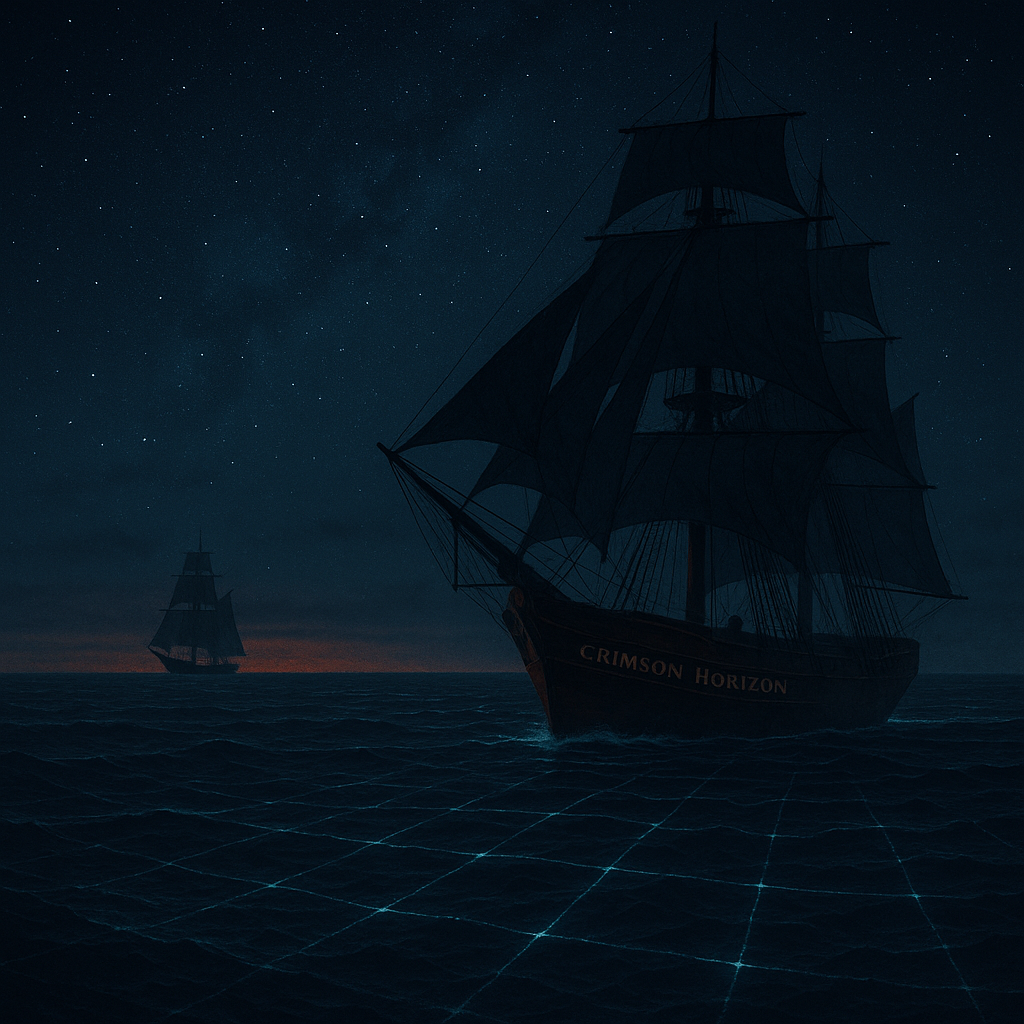
“Lattice,” Mireya said, low. “Where tides keep geometry.”
“Hold to true things,” Silas murmured. “Keel, crew, cost.”
Finn raised the Oculus. Through it the grid wasn’t just lines; it was music—nodes pulsing at different tempos, seams opening and closing like gills. His palm itched; a new knot burned into being along his life line: carrick bend—made for joining heavy hawsers that don’t like each other.
“Reading,” he said. “The nodes change on the bell.”
“Which bell?” Briggs asked.
“All of them,” Finn answered, and wished it were a joke.
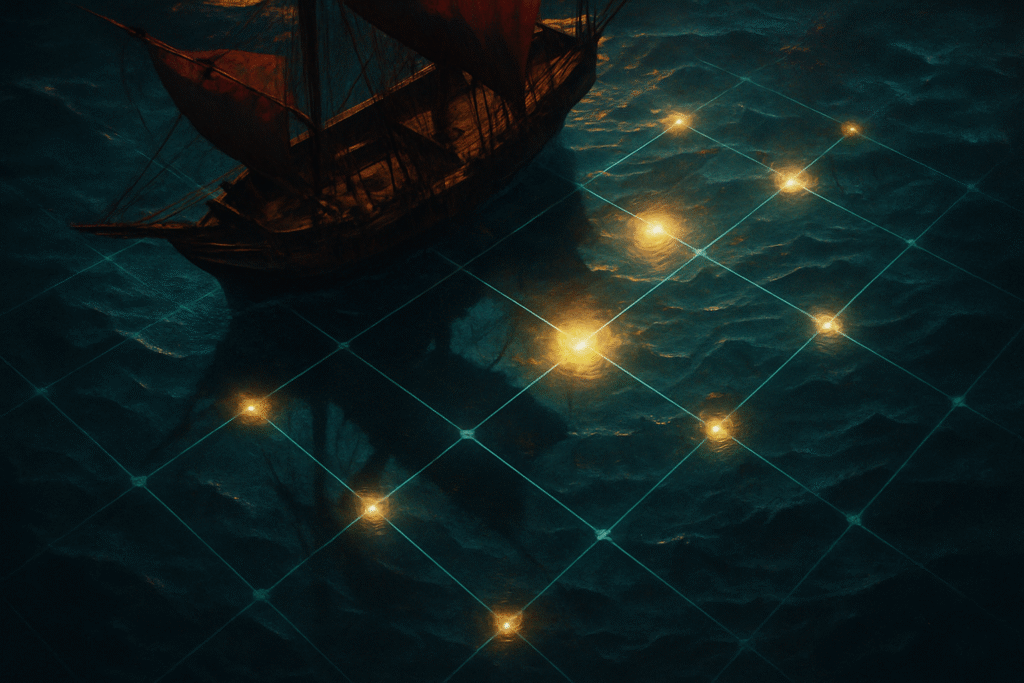
They ghosted in under topsails. Every miss-step would bill them minutes they could not spare—or worse, freeze them in a moment the way spray freezes on a yard in Arctic tales. Astern, the Santa Lucía kept station, her cracked Ash Mirror bandaged in brass, her surveyors launching pale kite-buoys with eyes inked on their bellies. The kites tugged at the grid, pinning seams open where the frigate wished them open.
“Hunters with pins,” Mireya said. “We need a seam ripper.”
“Or a stitch,” Silas said. “Tie us something the sea believes.”
Finn set the Oculus to the star-compass; mercury sketched nodes and intervals; his palm-lines brightened to answer. “We can cross on the eighth and twelfth—if we join their tempos.”
“How?” Briggs asked, already stripping coil from a belaying pin like rope could argue back.
“With a song you can count to twelve,” Finn said. “And a knot big enough to convince time it’s one piece.”
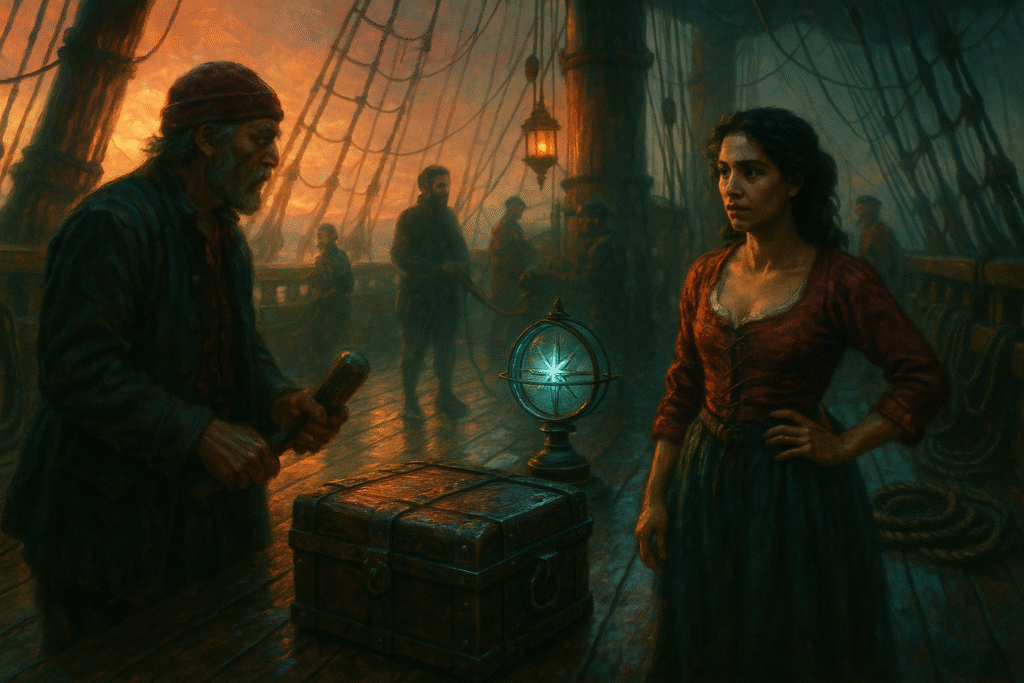
They sang—not pretty, useful. Briggs beat the rail in slow twelves; Mireya set the off-count; Hayes breathed the wheel to match. Finn laid both hands on the rail, feeling the carrick form in his bones: over-under, turn and tuck, dress it neat so strain won’t bite.
“Now,” he said on the twelfth, and Silas put the brig’s nose into the first seam.
The grid accepted them. Under the keel a dull light ran forward like a fuse, connecting nodes that had no reason to be friends. Finn felt the knot hold—and then stress as the Santa Lucía did what wolves do when a door closes: she pushed.
The cracked mirror pinched wind. Kite-buoys dove; inked eyes flared; a pinned seam tried to re-lace under the brig’s quarter.
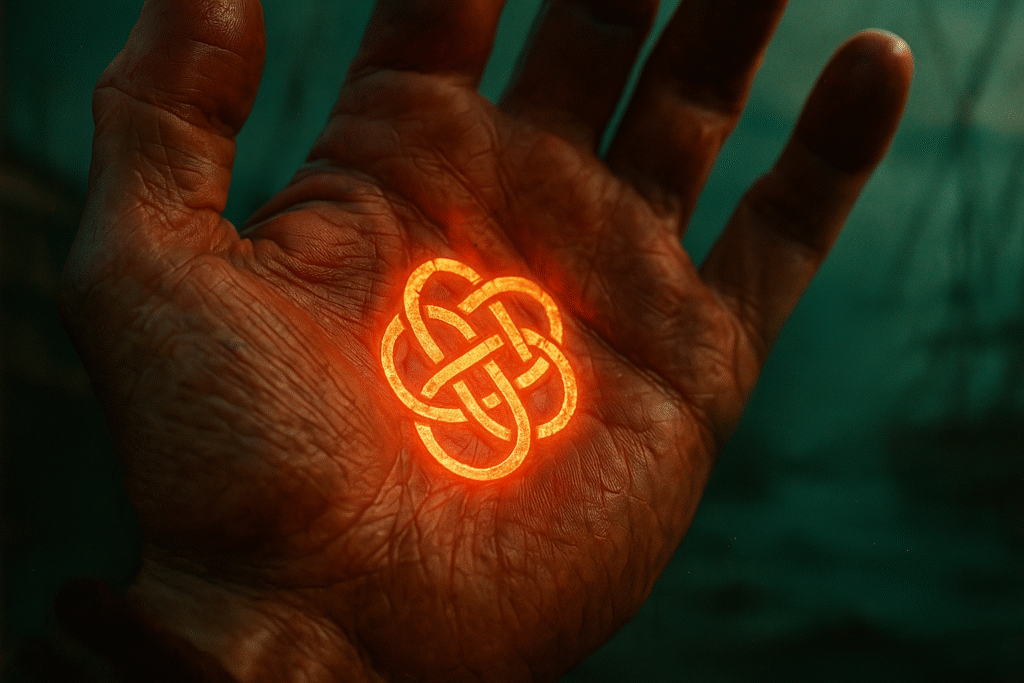
“Hold,” Silas said, and nobody heard panic in it. “Give me a hair starboard.”
Hayes gave him two hairs, then stole one back. The brig slid over a soldered joint in the lattice—a join that didn’t look like it should work and did because someone believed it hard enough. The sea ticked. The count changed.
The frigate answered with weights—charcoal-black plummets that hit the lattice and spread dark like oil, slowing the grid’s pulse and making eddies where none should be.
Mireya’s mouth went thin. “They’re braking the measure.”
“Then we spend a bell,” Silas said. “We’ve been cheap too long.”
He glanced at Finn. Finn nodded once, because choices get lighter when you hold them. He opened the chest; the serpent lock tasted his skin and allowed it. The crew cupped breath into their palms and gave a minute apiece. The star-compass drank it and extruded a silver runner along the lattice, narrow as a blade.
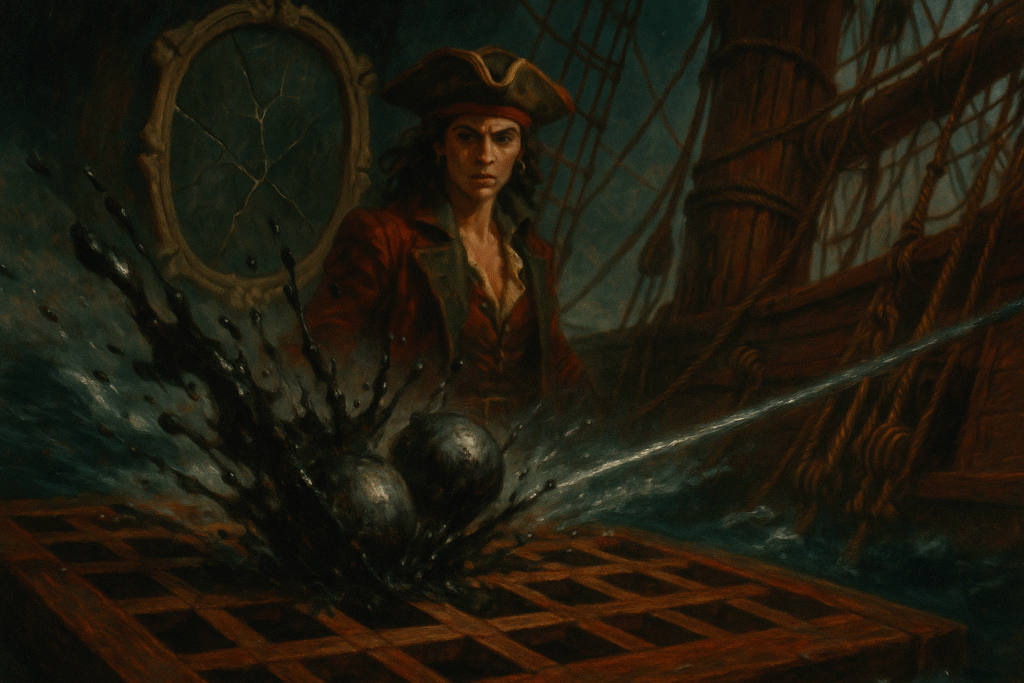
“Follow the runner,” Finn said. “And do not look down.”
Briggs looked down anyway—because he is the sort of man who inspects the drop before he steps across it. Beneath the runner the grid showed what it had stored: ships paused mid-broach, gulls held like cut paper, a boy not much younger than Finn reaching for a rope that would never answer. The bosun blinked salt out of his eyes and looked away.
They crossed three nodes clean. The fourth miscounted them—an off-tempo pulse the mirror had bruised. The carrick creaked in Finn’s bones. The runner went thin as wire.
“Sing it truer,” Mireya said through her teeth, and raised the off-count. The crew answered like a single lung. The node remembered what it had been before being bullied and matched them. The runner fattened to safety’s width.
The Santa Lucía refused to be left. Valdés took the mirror in both hands and did less, which is a particular skill. She set the absence of pressure in exactly the right pocket and let the grid hurry toward it. Her frigate slid along a shortcut the lattice offered only to those who don’t ask loudly.
“She learns quick,” Briggs said, equal parts respect and profanity.
“She learned before,” Finn said, and felt the truth of it: this wasn’t her first count. The mirror’s cracks weren’t from pride alone.
The final node—the gate out of the Shoals—lurched off the twelves and fell onto a nine.
“Tie the nine to the twelve,” Silas said, as if weights were the same kind of thing as rope. “Make ‘em agree for long enough to get a keel through.”
Finn breathed once, twice, and set the carrick in his palm to join unlike lines: nine over twelve, dress it flat, hide the ugliness under the working part. He felt the knot set like bone knitting. The grid hesitated—and then held.
“Now,” he said.
They went.
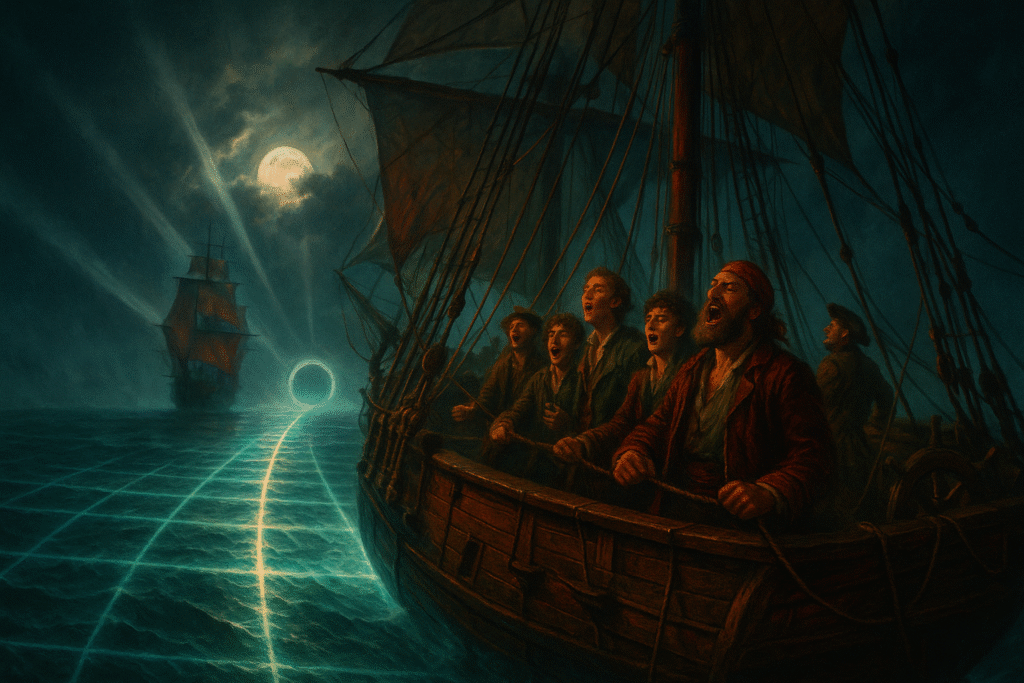
The Crimson Horizon cleared the gate as it shut, a guillotine deciding to be merciful. The lattice winked out behind them, the Shoals losing interest like a clerk closing a ledger.
The Santa Lucía hit the gate breath late and rang. Not ship-breaking; not today. Just enough to make her masts forget their posture and her figurehead remember a different laugh. Valdés stood through it as if wind were a habit she intended to keep.
They came up on even water, honest wind, room enough for manners. The Spanish launch fell from davits; the Capitana stood in its bow and hailed without wasting distance.
“Blackthorne,” she called. “You’re paying someone’s debts. Someday you’ll pay mine.”
Silas tipped his hat the exact inch that says I hear you and also no. “Someday we’ll square all the books,” he said. “Not today.”
Valdés glanced past him to Finn and the Oculus—and, for the first time, to Mireya, whose mouth had done more than most men’s swords. There was no smile. There was notice.
She rode her launch back without dramatics. The frigate fell in two miles astern, patient as a reef.
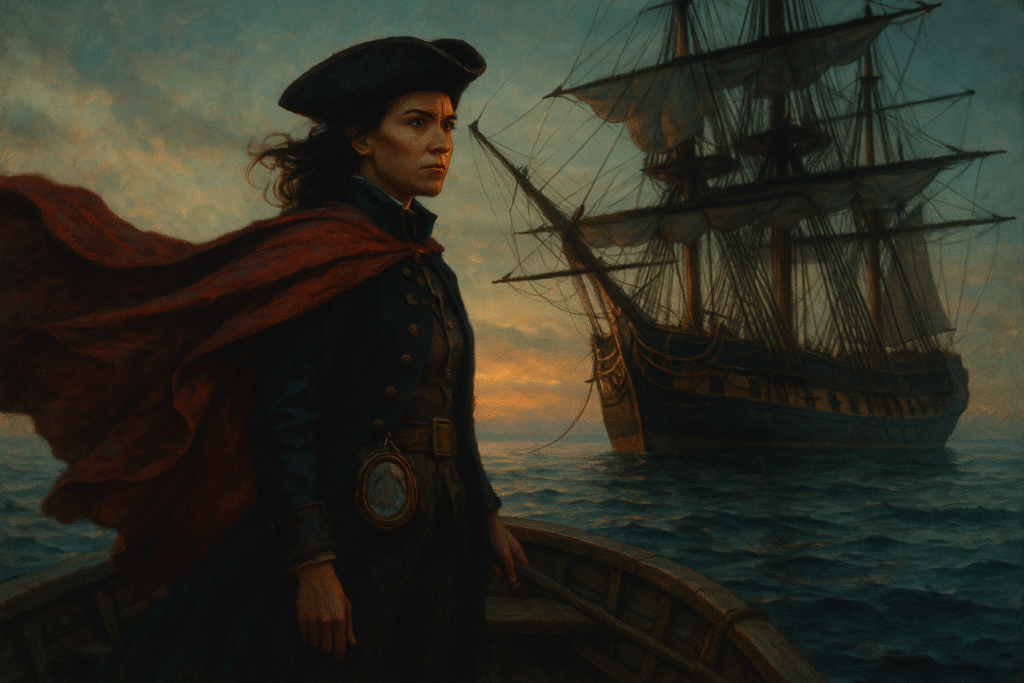
Night gathered from the east like a promise it meant to keep. The star-compass slowed its noise; the serpent lock blinked as if it dreamed. Finn lifted the Oculus and let the constellations pour a line into him. The mercury wrote two words with the certainty of unpaid history:
Meridian Abbey.
Silas breathed out a laugh that had wanted to be a sigh. “Lessons and ledgers,” he said. “We keep collecting schools with their own tuition.”
“Keel, crew, cost,” Mireya said, ticking each with a finger. Then, softer, “And time.”
“And stubborn,” Briggs added, because rituals endure where prayers fail.
They made sail, not fast and not slow—the kind of speed that lets a man listen to a deck’s hundred small truths. The Shoals went dark behind them, grid forgotten, water once more a language the ship spoke without showing off.
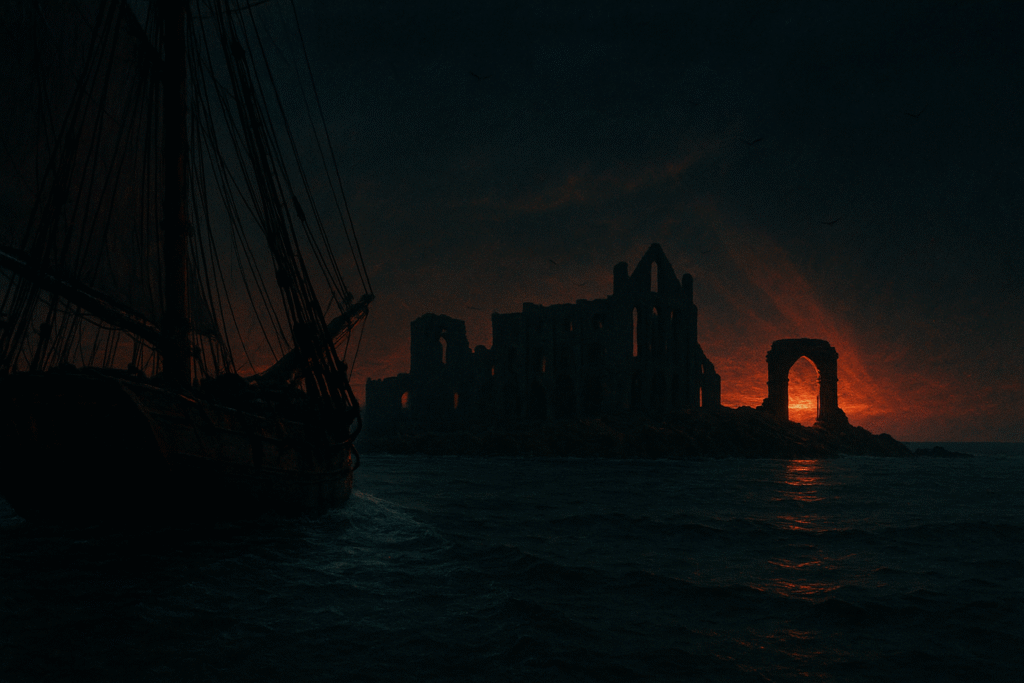
—To be continued—
